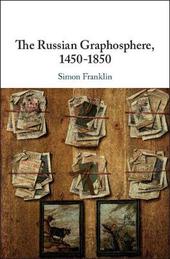
|
The Russian Graphosphere, 1450-1850
Hardback
Main Details
| Title |
The Russian Graphosphere, 1450-1850
|
| Authors and Contributors |
By (author) Simon Franklin
|
| Physical Properties |
| Format:Hardback | | Pages:428 | | Dimensions(mm): Height 235,Width 158 |
|
| Category/Genre | Literary studies - classical, early and medieval
Literary studies - c 1500 to c 1800 |
|---|
| ISBN/Barcode |
9781108492577
|
| Classifications | Dewey:491.711 |
|---|
| Audience | | Professional & Vocational | | Postgraduate, Research & Scholarly | |
|---|
| Illustrations |
Worked examples or Exercises; 1 Tables, black and white; 30 Halftones, black and white; Worked examples or Exercises; 1 Tables, black and white; 30 Halftones, black and white
|
|
Publishing Details |
| Publisher |
Cambridge University Press
|
| Imprint |
Cambridge University Press
|
| Publication Date |
16 May 2019 |
| Publication Country |
United Kingdom
|
Description
The 'graphosphere' is the dynamic space of visible words. Graphospheres mutate, they are reconfigured with changes in technology, in modes of production, in social structures, in fashion and taste. The graphospheric environment can be public or private, monumental or ephemeral. This book explores a new approach to the study of writing, with a focus on Russia during its 'long early modernity' from the late fifteenth century to the early nineteenth century. Taking an inclusive approach, it charts unmapped territory, uncovers sources that have almost entirely escaped attention and therefore provides, in the first instance, a unique reference guide to cultures of writing in Russia over four hundred years. Besides generating fresh insights into distinctive features of Russian culture, this outward-looking and accessible book offers a pioneering case study for the wider comparative exploration of the significance of technologies of the word.
Author Biography
Simon Franklin is Professor of Slavonic Studies at the University of Cambridge. He is the author of Writing, Society and Culture in Early Rus, c.950-1300 (Cambridge, 2002), and has edited, with Emma Widdis, National Identity in Russian Culture (Cambridge, 2004); and, with Katherine Bowers, Information and Empire: Mechanisms of Communication in Russia, 1600-1854 (2017).
Reviews'Recommended for libraries supporting Slavic, East European, and Central Eurasian graduate studies. Includes a most extensive bibliography.' B. K. Beynen, Choice '... insightful ... Franklin takes the reader into a world where writing and reading signalled something very different from what they do today.' Marshall Poe, The Times Literary Supplement 'Franklin has written an important book, one that inspires readers to reevaluate past assumptions about the history of material texts, categories of writing and the institutions that determine their value. His is a work whose implications extend beyond the chronological and geographical indicators of its title and that has the potential to establish a new branch of literary and cultural studies beyond the boundaries of our field.' University of Southern California Book Prize in Literary and Cultural Studies Committee 'Franklin introduces the term [graphosphere] as a 'near neologism,' and with it, inaugurates an entire field. Now that he has done so, readers have cause to celebrate. This is a rare book that opens eyes and reveals new vistas for thought, imagination, and scholarship. It is as electrifying in its novelty as it is dazzling in its erudition ... The cumulative force of the book allows us to see the concept of the graphosphere emerge out of a haze and solidify as a real and important way to look at the world, to think about culture and history, to unearth new information and gain new perspectives by cutting across familiar categories in unexpected ways.' Valerie A. Kivelson, Canadian-American Slavic Studies
|